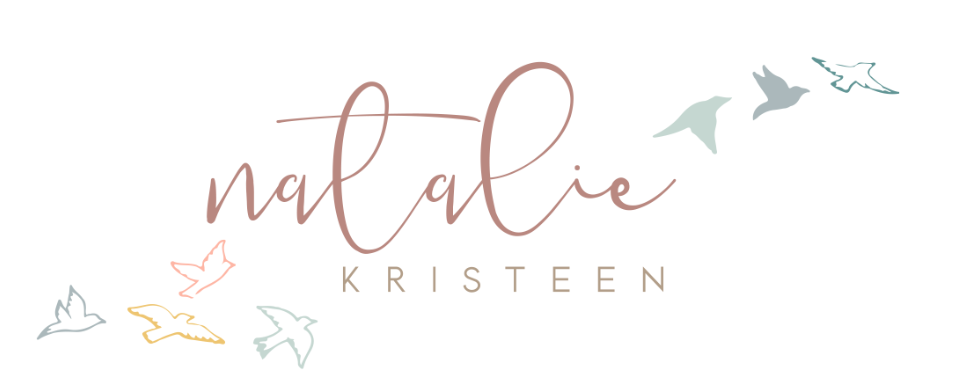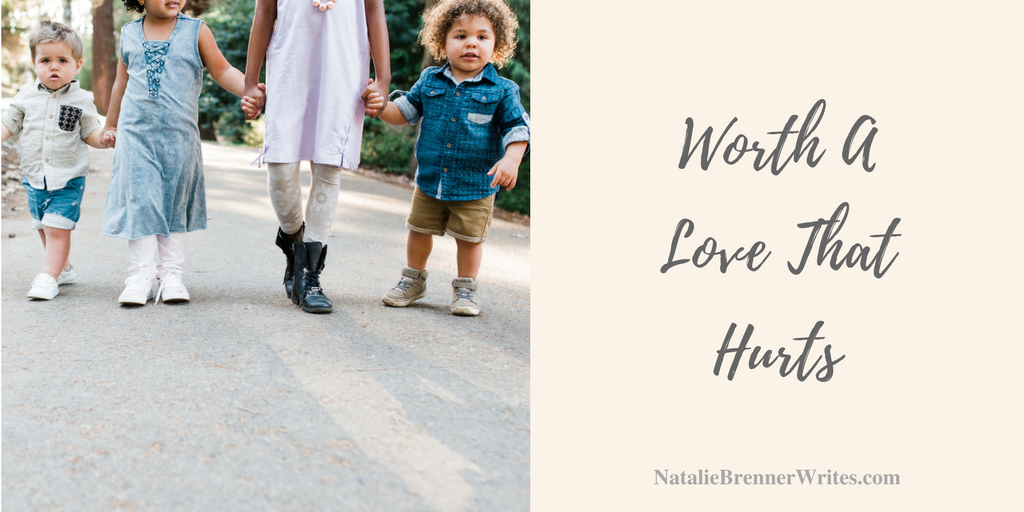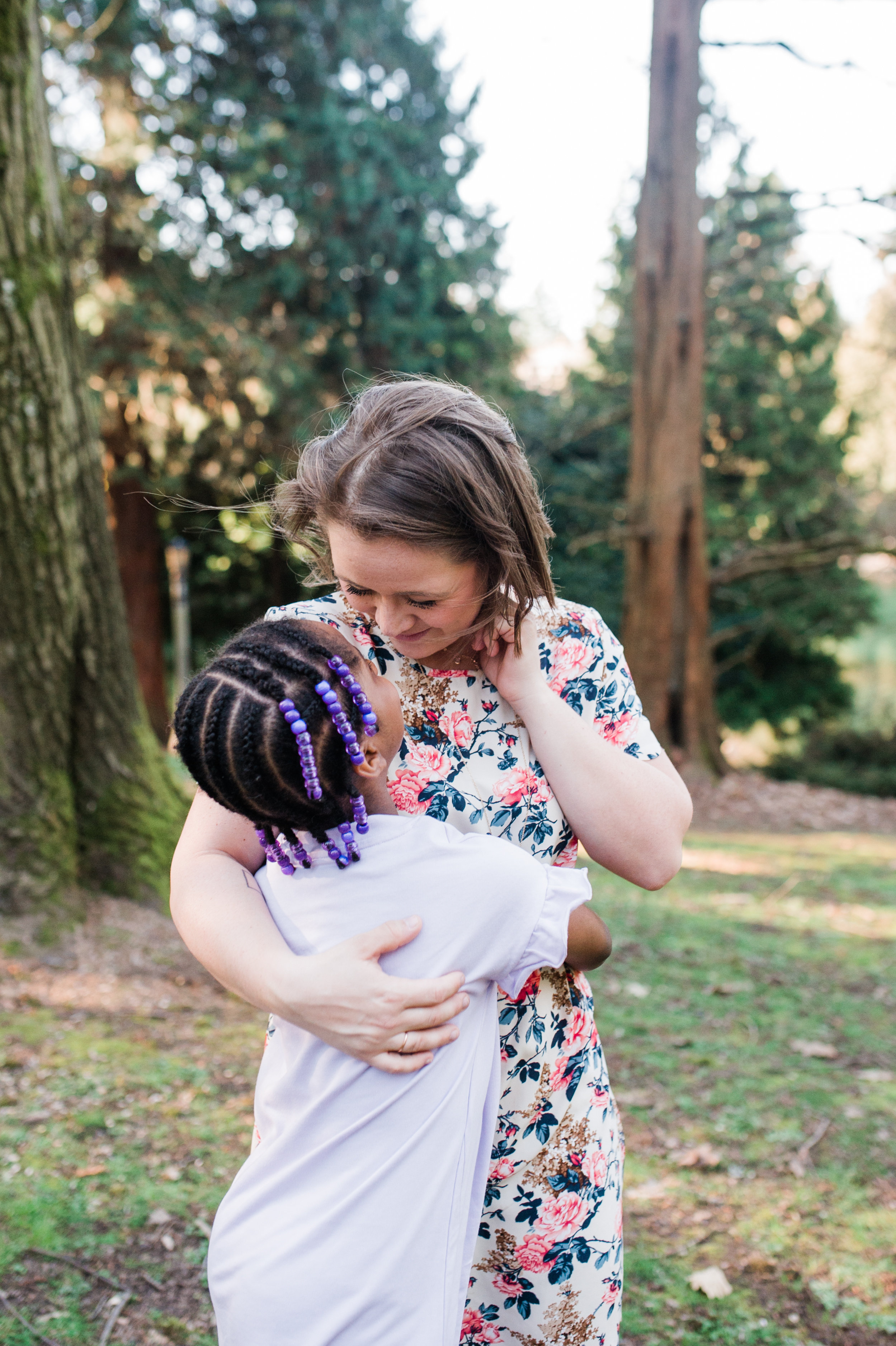Worth A Love That Hurts
Sometimes I think the most loving thing we can do for someone is to hurt with them. Maybe even for them when hurting seems too scary.
I spent the other night cleaning up a trail of vomit that was a result of pent up anxiety, bottled up and begging its way out. After I dumped lysol over the freshly cleaned floor, I sat on my bed and let tears slip from my eyes.
Becoming safe parents for deeply wounded babies in children's bodies is heavy. It's hard. It's painful. Every piece of me aches for wholeness for them. So I will keep bringing them to the feet of my Jesus, begging Him to show up in ways I could never dream of.
There are parts of their stories I will never know the extent of; the parts revealed have broken me in places only Heaven can heal. I cannot fathom the depths of their pain if mine runs soul deep simply from hearing them recount their memories.
I so badly want them to know it's okay to break. It's in the breaking we find healing, but I know these things take time. So I decided long before they joined us—I decided when Sage joined us—that I would break for these babies until they felt ready to break too.
It's scary to let yourself feel all the hurt pent up inside.
There is the multi-cultural piece that will always be an ache for these babies, as long as they're in my home.
That I—a white woman with straight light hair and blue eyes—have the broken privilege of being mama to these three melanin-rich, textured-headed babies not born of my womb...well it stops me short many times over.
It's a loss in ways I will never fully understand to be living in a home with white parents in a predominantly white city—they don't get to see themselves in us.
They hold up their arms to mine on a near-daily basis, comparing skin tones and playing with our varying hair types. Asking things like, "Are you sure you like my skin?"
I remind them over and over again they are beautiful, made wonderfully, knit so carefully together. Every strand of their DNA was purposed and perfect.
I tell them some of my very favorite people look so much like them: dark skin, textured hair, brown eyes mirroring kindness. And I mean it.
We have books reflecting strong and brave people of color, books with kids and adults who have all colors of skin. Art on our walls reflect brown and white hands holding, Ethiopian art pieces hang with the hope of revealing how valuable different heritages are. But I am told and have read and believe: it's still a loss to be black and raised by white parents, no matter how many books and art pieces fill our home, no matter how many friends of color we have.
I give them permission to be sad about not living with a brown family. I tell them it makes sense, it's okay, and that we will continue spending as much time as possible with all our brown friends.
And then I sit with them in the silence that often follows, sometimes with snuggles, allowing the sadness to fill the air for the moments it needs to until the next time the conversation surfaces.
all photos by Kersten Green Photography at Laurelhurst Park
Something I believe is that I can choose to notice their skin and their need to see themselves represented in adults and friends, or I can choose to discount that need.
I believe racial justice can be worked towards in and through foster and adoptive parenting — I'm a white mama parenting three black and brown children, what kind of opportunity to be a piece of the bridge is that?
What I have discovered is, I can decide to actively participate in nurturing their whole identity, or I can choose to leave that giant portion of themselves out of my intentional parenting. I can neglect their ethnic and cultural identities, try to blend them into our white Christian family, or I can open up my eyes to see them exactly how God made them: melanin-rich, textured hair, aching to know people that look like them.
I find myself privileged that I get to hurt with them in these spaces, acknowledging the reality of spaces of pain. Their entire world has been disrupted and it is the least I can do to sit in their hurt with them.
They ask about home and family; I remind them they now have multiple families, us being one of them. And this is their home, for now, for awhile. This is home. It's still something they are getting used to—aren't we all though?
We shared that Sage has two families too, and one of his first parents is black like them: I could see in their lit-up eyes they felt less alone in our family knowing that.
You know how love is patient and kind and not self-seeking? I think that means being patient and kind when our kids are hurting over loss. I think it means not seeking our comfort in control, and sitting in the mess with them. Telling them they are enough, even with all the hurt.
I want to love them well and let them know they are ENOUGH, exactly how they are: uncertain and unsettled, children from hard stories and confusing currents.
They are smart. They are strong. They are brave. I tell them this often.
Their sadness permeates our home, and we do our best to balance the tension of sitting in the sad and engaging in fun activities to create a variation of childhood memories.
Oh how I want them to have some memories to look back on with a smile, even if it is bitter and sweet.
They are beautiful from their bones to their bruises, their dark curls to their brown toes. I want to honor every piece of them, including the pieces that are different from me.
May they walk in their different-than-my skin in confidence, knowing they are worth their own confidence.
We hear a lot that they are lucky to be with us. It's one of those well-intended statements that makes me sick and sad and all the things in between.
When you slow down to think about it, they are living some of the hardest stories known.
They aren't lucky, you know.
Lucky is winning the lottery.
Lucky isn't being ripped from your family and all you know, being forced into a system that doesn't have its stuff together, and into a family of strangers.
If I've learned anything from Jesus in the last few years, it is that He absolutely validates and sits with us in pained-places. He loves us in our places that hurt and doesn't force us to feel anything but what we feel.
When the world tells them they are lucky, I will look them in the eyes and tell them they are loved, and it's okay if they don't feel lucky. It's okay if they instead feel sad.
When the world tells them they are not worthy, they are not enough, or they are "too broken," I hope to instill in them the deep Truth that they are worth every ounce of Goodness and more.
They are worth patience, kindness, hope, protection, safety, trust, and perseverance.
They are worth all the hard work, the sacrifices, the pain that comes from sitting in suffering with them, and they deserve what every single child deserves: a love that hurts with them and rejoices with them and goes into all the tattered places with them.
Jesus, be near your babies and give them Yourself in all the unluck handed to them. You are the picture of Love I want to model: the kind that wears scars from your suffering, even in your resurrected and perfect body.
You told me that I was worth a Love that hurts: help me love like You.
Just some jumbled thoughts from a jumbled heart wanting to love well in the cracks of humankind.
Support our favorite organizations that support foster families and kids in care:
Volunteer at a Foster Parents Night Out











